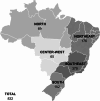Ethical regulation of biomedical research in Brazil: a quality improvement initiative
- PMID: 38858731
- PMCID: PMC11163760
- DOI: 10.1186/s12910-024-01065-5
Ethical regulation of biomedical research in Brazil: a quality improvement initiative
Abstract
Background: Q-CEP (Qualificação dos Comitês de Ética em Pesquisa que compõem o Sistema CEP/Conep) is a nationwide project resulting from a partnership between the Brazilian National Research Ethics Commission (Conep), the Ministry of Health and Hospital Moinhos de Vento (HMV). It was developed to consolidate policy for ethical review of research with human beings in all members of the CEP/Conep System, Brazil's national system of institutional review boards. The aim of this study was therefore to report on the experience and results of the Q-CEP project.
Methods: An observational, retrospective study includes data from the Q-CEP, obtained from visits to all the institutional research ethics committees (RECs) in the country. The actions implemented by Q-CEP were part of a two-step process: (i) training visits to each REC; (ii) development of distance learning modules on strategic topics pertaining to research ethics evaluation. The data presented herein cover step one (training visits), defined by Q-CEP as the diagnostic stage of the project. For a country with social and economics inequalities such as Brazil, this is a particularly important stage; an accurate picture of reality is needed to inform planning of quality improvement strategies.
Results: In 2019-2021, Q-CEP visited 832 RECs and trained 11,197 people. This sample covered almost all active RECs in the country; only 4 (0.5%) were not evaluated. Of the 94 items evaluated, 62% did not reach the target of at least 80% compliance and around 1/4 (26%) were below 50% compliance. The diagnostic stage of the process revealed inadequacies on the part of the RECs in their ethical reviews. The analysis of informed consent forms showed compliance in only 131 RECs (15.74%). The description of pending issues made by RECs in their reports was compliant in 19.33% (n = 161). Administrative and operational aspects were also considered inadequate by more than half of the RECs.
Conclusions: Overall, Brazilian RECs showed poor compliance in several aspects of their operation, both in ethics evaluation and in other processes, which justifies additional training. The Q-CEP project is part of a quality improvement policy promoted by the Brazilian Ministry of Health. The data obtained in the diagnostic step of the project have contributed to the qualification and consolidation of one of the world's largest research ethics evaluation systems.
Keywords: Brazil; Consent forms; Education; Research ethics committees.
© 2024. The Author(s).
Conflict of interest statement
The authors declare that they have no competing interests.
Figures
References
-
- UNESCO. Declaração Universal sobre Bioética e Direitos Humanos. 2005. http://unesdoc.unesco.org/images/0014/001461/146180por.pdf. Accessed 14 Apr 2019.
-
- UNESCO . Guía Nº 2. Funcionamiento De Los Comités De Bioética: procedimientos y políticas. Paris: UNESCO; 2006.
-
- Potter VR. Bioethics: bridge to the future. New Jersey: Prentice-Hall; 1971.
-
- Homedes N, Ugalde A. European Network Research Ethics Committee and ANCEI. The future of research ethics committees in Europe: creating the way to innovation. Barcelona: CEDRO; 2017. Latin American Research Ethics committees: whose interest do they serve? pp. 75–82.
Publication types
MeSH terms
LinkOut - more resources
Full Text Sources


